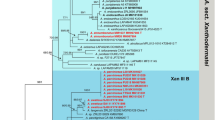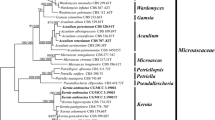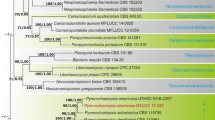Abstract
WHEN E. armeniacae Hansf. and Carter was described as the perfect stage of a known Cytosporina pathogen1, there was no record of the occurrence of a similar pathogen on apricot outside Australia. Soon afterwards, however, Dingley2 reported its presence in New Zealand after a collection referred to the Waite Institute had been matched with the type specimen.
This is a preview of subscription content, access via your institution
Access options
Subscribe to this journal
Receive 51 print issues and online access
$199.00 per year
only $3.90 per issue
Buy this article
- Purchase on Springer Link
- Instant access to full article PDF
Prices may be subject to local taxes which are calculated during checkout
Similar content being viewed by others
References
Carter, M. V., Austral. J. Bot., 5, 21 (1957).
Dingley, J. M., Orchard N.Z., 33, 78 (1960).
English, W. H., Davis, J. R., and Devay, J. E., Phytopath., 52, 361 (1962).
Carter, M. V., Austral. J. Agric. Res., 11, 498 (1960).
Moller, W. J., J. Dept. Agric. S. Austral., 67, 251 (1964).
Author information
Authors and Affiliations
Rights and permissions
About this article
Cite this article
CARTER, M., MORVAN, G. & CASTELAIN, C. An Extension of the Known Distribution of Eutypa armeniacae. Nature 202, 1134–1135 (1964). https://doi.org/10.1038/2021134c0
Issue Date:
DOI: https://doi.org/10.1038/2021134c0
Comments
By submitting a comment you agree to abide by our Terms and Community Guidelines. If you find something abusive or that does not comply with our terms or guidelines please flag it as inappropriate.



